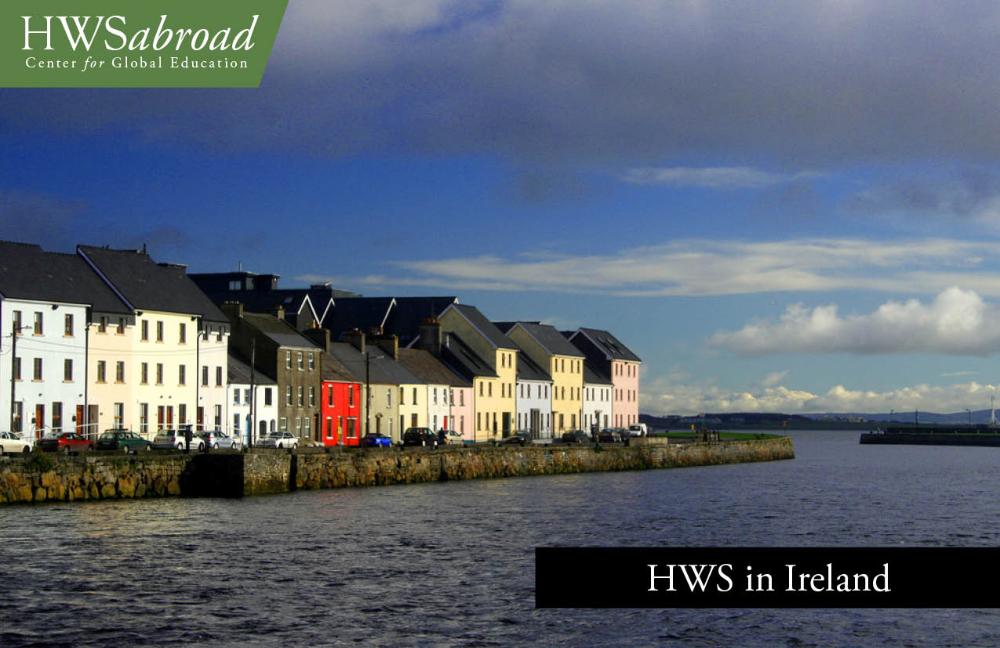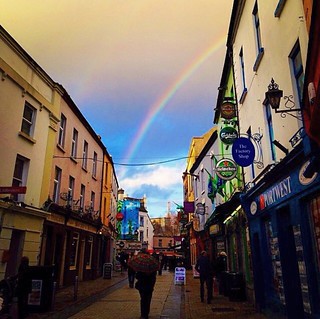
Galway, Ireland
Galway, a university town with a vibrant artistic and cultural atmosphere, is the administrative capital of County Galway and the largest city in the West of Ireland. This area of the country is noted for its geographic and cultural distinctiveness.
With the largest concentration of Gaelic-speaking communities in Ireland, the West is widely recognized as the most typically "Irish" part of the country. The Gaelic heritage is perhaps most evident in the Aran Islands (Inishmore, Inishmaan, and Inisheer), located just off the coast at the entrance to Galway Bay.
About the Program
Hobart and William Smith Colleges maintain an affiliation with the University of Galway to provide students with the opportunity to live and study among Irish students at an Irish university. Participants in the program are also encouraged to join one of the many university clubs and organizations in order to directly experience Irish student life and culture. Community service options are available and provide a unique opportunity for students to gain access to the local community.
This program consists of a combination of special courses taught for the group and regular university courses. All students will take two required courses:
Contemporary Irish Culture and Society (1 credit)
This course, an interdisciplinary survey designed to give students insight into important historical events and processes that have shaped Irish culture and society, is organized and taught by faculty from the Centre for Irish Studies at the University of Galway. A series of excursions are linked to this course and will serve to illustrate key themes and topics.
Spring 2026 Director's Seminar: The Politics of Irish Cultural Production: Interrogating the intersections between art, power, and resistance
Ireland has a rich history of cultural production, from music to murals, plays to paintings, fiction to film. This art does not exist in a vacuum; situating these cultural works in their political and historical contexts provides a deeper understanding of the works themselves. Interrogating the politics involved in cultural production illuminates the important intersections of art, power, and resistance. This can particularly be seen in Ireland, where art has informed, reflected and engendered a history of political engagement. This course will teach students how to investigate the politics of cultural production from various theoretical perspectives. The political work involved in Irish cultural production will be explored with specific focus on music, visual arts, and literature. This exploration will be achieved through readings and experiential engagement, including out-of-classroom visits to museums, art galleries, music venues, and public displays of art in Galway, Belfast and Dublin. Students will gain an appreciation of the politics of contemporary cultural production through a final assignment that requires them to engage in direct ethnographic work with contemporary Irish artists.
Fall 2026 Director’s Seminar: Representing Ireland: Multimedia (1 credit)
“What does it mean to be Irish? It means to ask what it means to be Irish.” (White, Trevor, The Irish Times 2011)
Ideas of Ireland have been exported through art, commerce, marketing and travel. Galway, marketed as “Ireland’s Cultural Heart” and a center for both traditional and contemporary arts will serve as an ideal environment in which to investigate and interrogate complex representations of Ireland. In this class, we will analyze representations of Ireland across a range of media and produce our own. Prior to departure, students will survey tourism materials for frequently-repeated images, phrases and ideas. This entry point will help students build awareness of preconceptions and marketed ideas, and prepare them to open up critically to surprise, challenge, and revelation upon arrival. In addition to critical readings which will frame and enrich the idea of representation, we will compare and contrast exported cultural products to works which speak to an internal audience. Outings to cultural venues and resources will provide further immersion in Irish representations as we investigate Irishness in the context of key cultural and political events of the 20th and 21st centuries. Students will propose final projects which relate to their majors, with a view towards developing a portfolio of work suitable for inclusion on CVs or in applications to graduate school or grants.
This course will be cross-listed in English and Creative Writing and Media and Society.
Elective Courses (2 courses/2 credits)
Some sample course titles include:
Introduction to Northern Irish Politics
Feminist Thought
Shakespearean Comedies
Short Plays of Samuel Beckett
Women in Irish Society Irish Art
Drama and Theatre Studies
Gaelic Language
Scottish Short Stories
Church and State in Ireland
Contemp. Irish Poetry
The English Language in Ireland
Irish Famine in a European Perspective
ACADEMIC FOCUS
The Galway program is accessible to students from virtually any academic discipline as participants will be able to select two courses from the University of Galway catalogue. Note that access for international students to some University of Galway courses is limited due to such factors as the duration of the course and the nature of course prerequisites. Science students with very specific course needs are advised to consult with staff at the Center for Global Education before applying to this program.
This program is open to juniors and seniors (sophomores may be considered in exceptional cases) in good academic and social standing with a minimum GPA of 3.0. Students may be required to successfully complete a Reader's College orientation course during the semester preceding the program. Due to the challenging nature of study abroad, student academic and disciplinary records will be carefully screened.
Students participating in this program will be housed alongside Irish and international students in flats in a complex called “Gort na Coiribe”, located on the Headford Road about a 10-minute walk from the University of Galway campus. Fully equipped kitchens are included in the flats and a large shopping center and a cinema complex are nearby. As you are responsible for your own meals on this program, you may choose to prepare your own at home. In addition, full meals may be purchased at the university canteen at government-subsidized prices. To view the accommodations, visit the Gort na Coiribe website at http://www.gortnacoiribe.com
Several excursions linked to the Irish Culture and Society course are included as part of this program. They typically include visits to Northern Ireland, Dublin, Cork, Kerry, and the Aran Islands. Some local excursions in and around Galway may be organized as well.
Students will be charged standard HWS tuition and fees, room fees, and a $600 administrative fee. This will cover tuition for a four-course semester, health insurance, housing, and program-related activities and excursions. Note that no HWS board fee will be charged. Students should plan to bring their board fee to cover meal expenses throughout the program. While meal expenses will vary according to individual tastes, we estimate $2300-$2500 should be sufficient for students who prepare their own meals.
Additional expenses not covered include airfare, visa, books, and personal expenses (laundry, entertainment, ground transportation, and independent travel). We estimate airfare for this program at $900-$1100 from the East Coast, visa at $350, and books at $250. It is difficult to give an accurate estimate of personal expenses because student spending habits differ considerably. We would suggest a minimum of $1500 above and beyond meal expenses. However, students on a tight budget should be able to manage with less. If you are concerned about finances, we strongly encourage you to talk to the CGE staff who can offer information and advice based on your specific situation.
Additional grant funding is available to students with financial need to defray these costs. Some grants come directly from HWS, and others are external, national competitions. You can find more information here. If you are concerned about finances, we strongly encourage you to talk to the CGE staff who can offer information and advice based on your specific situation.
HWS students must complete all components of the Global Education application in order to be considered for admission to this program.
- This program is offered every semester.
- All components of the application must be submitted online by the published deadline. Specific deadline dates are set each semester and typically will be in late September/early October (for Fall programs) and late February/early March (for Spring programs).
Program Handbook
IMPORTANT: The handbook(s) below is/are the most recent handbook(s) to date that have been uploaded by CGE staff. Program participants receive their updated copy of the handbook 2-3 months prior to their specific program's start date.
FALL HANDBOOK / SPRING HANDBOOK
Please DO NOT MAKE TRAVEL ARRANGEMENTS for your program until you have received a notification from the CGE letting you know that the most recent version (your version) of the handbook (along with program start/finish dates) has been posted online and sent to your e-mail.
NOTE: The information above is subject to change. Please see the CGE for more information.
Resources for Smart Travelers
Rick Steves's Packing Tips!

